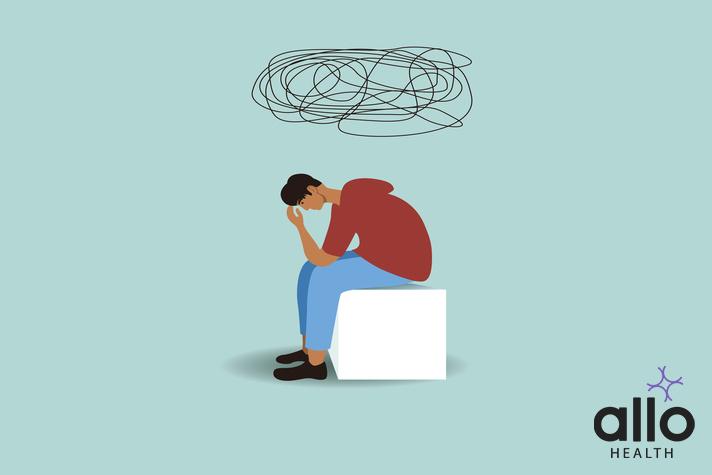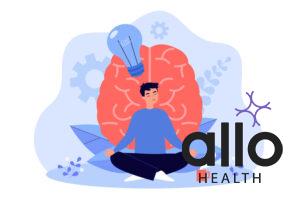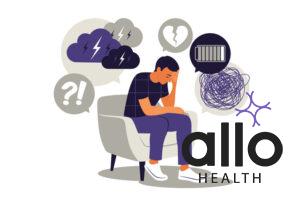Overcoming Masturbation Addiction: A Guide to Effective Medicines

Allo Health is dedicated to personalized well-being, offering support and trusted information tailored to individual health goals. The platform emphasizes human-generated content, led by a distinguished medical team of experts, including physicians and sexual health specialists. Their commitment to credibility involves rigorous fact-checking, authoritative research, and continuous updates to ensure accurate, up-to-date information. Allo Health's unique approach goes beyond conventional platforms, providing expert-led insights and a continuous commitment to excellence, with user feedback playing a crucial role in shaping the platform's authoritative voice.

Ms Miriam is a licensed Clinical Psychologist and Psychotherapist, who completed her training and licencing from the National Institute of Mental Health and Neurosciences (NIMHANS), and has experience in working with patients in areas of adult psychiatry, child and adolescent psychiatry, addiction medicine, neuropsychology and family & marital therapy.
Why This Was Upated?
Our experts continually monitor the health and wellness space, and we update our articles when new information became available.
Updated on 21 March, 2024
- Article was updated as part of our commitment to diversity, equity, and inclusion.

"The following blog article may discuss medical treatments and interventions. However, it is important to note that the information provided is for general educational purposes only and should not be considered as a substitute for professional medical advice, diagnosis, or treatment. Always seek the guidance of a qualified healthcare professional for personalized medical advice.
Book consultation
Medical treatments are complex and should be tailored to individual circumstances. The information presented in this blog may not be applicable to everyone, as each person's medical condition, history, and needs are unique. Only a qualified healthcare professional can evaluate your specific medical situation, consider relevant factors, and provide appropriate recommendations for diagnosis, treatment options, and monitoring.
It is crucial to note that self-diagnosis, self-medication, or relying solely on the information provided in this blog for treatment decisions can have serious health consequences. "
Masturbation is a natural and healthy activity for many people. However, when it becomes an addiction, it can lead to problems that negatively impact a person’s life. Like any addiction, it can be difficult to overcome, and sometimes medication is prescribed to help with the process. In this article, we will discuss the medications used for masturbation addiction, including why they are prescribed, what they do, how they help, and the psychology behind it.
What is Masturbation Addiction?
Masturbation addiction, also known as compulsive masturbation, is a type of behavioral addiction that involves the uncontrollable urge to masturbate excessively. This behavior can have a negative impact on a person’s life, including their relationships, work, and overall well-being. Some common symptoms of masturbation addiction include:
- An inability to control the urge to masturbate
- Spending a significant amount of time masturbating each day
- Neglecting responsibilities or obligations to masturbate
- Experiencing negative feelings such as, guilty or shame, after masturbating
- Feeling anxious or irritable when unable to masturbate
While there is no clear consensus on what causes masturbation addiction, some theories suggest that it may be related to imbalances in the brain’s reward system, similar to other types of addiction, other factors could include inadequate coping mechanisms, distress tolerance issues, boredom, etc.
Medicine For Masturbation Treatment
While psychotherapy and lifestyle changes can be effective in treating masturbation addiction, medication can also be prescribed to help manage symptoms. Medications may be prescribed in adjunct with psychotherapy, or when the addiction is severe or when other treatments have not been effective. Some common medications used for masturbation addiction include:
- Antidepressants: Antidepressants are often prescribed for masturbation addiction because they can help regulate the brain’s reward system. They work by increasing the availability of serotonin and other neurotransmitters in the brain, which can reduce the urge to masturbate excessively. Antidepressants may also help with underlying mental health conditions that may contribute to the addiction.
- Antipsychotics: Antipsychotic medications are sometimes prescribed for masturbation addiction when there are underlying psychological conditions present, such as bipolar disorder or schizophrenia. These medications can help regulate mood and reduce impulsivity, which can help with the urge to masturbate excessively.
- Mood stabilizers: Mood stabilizers, such as lithium, may be prescribed for masturbation addiction when there are underlying mood disorders present. These medications can help regulate mood and reduce impulsivity, which can help with the urge to masturbate excessively.
What Do the Medications Do?
The medications used for masturbation addiction work in different ways to manage symptoms.
Antidepressants
Antidepressants are medications primarily used to treat depression, anxiety, and other mood disorders. While they may have some impact on libido and sexual function, they are not specifically prescribed to treat masturbation addiction.
There is some evidence to suggest that certain types of antidepressants, such as selective serotonin reuptake inhibitors (SSRIs), may be helpful in treating compulsive sexual behaviors, including masturbation addiction. SSRIs work by increasing levels of the neurotransmitter serotonin in the brain, which can help to regulate mood, reduce anxiety, and decrease impulsivity.
However, it’s important to note that the use of antidepressants for the treatment of compulsive sexual behavior is not well-established, and more research is needed to determine their effectiveness and appropriate use. Additionally, antidepressants can have side effects, and should only be taken under the guidance of a qualified healthcare provider.
Antipsychotics
Antipsychotic medications are primarily used to treat psychotic disorders such as psychosis sprectrum disorders and bipolar disorder, as well as certain other conditions such as severe anxiety and depression. While they may have some impact on sexual behavior, they are not specifically prescribed to treat masturbation addiction.
There is limited evidence to suggest that certain types of antipsychotic medications, such as risperidone and aripiprazole, may be helpful in reducing hypersexuality and compulsive sexual behaviors in some individuals. These medications work by blocking dopamine receptors in the brain, which can help to reduce impulsive behaviors and decrease sexual desire.
However, the use of antipsychotic medications for the treatment of compulsive sexual behavior is not well-established, and more research is needed to determine their effectiveness and appropriate use. Additionally, antipsychotics can have significant side effects, including weight gain, metabolic changes, and movement disorders, and should only be taken under the guidance of a qualified healthcare provider.

Mood stabilizers
Mood stabilizers are medications used primarily to treat mood disorders such as bipolar disorder and as well as certain other conditions such as epilepsy. While they may have some impact on sexual behavior, they are not specifically prescribed to treat masturbation addiction.
There is limited evidence to suggest that certain types of mood stabilizers, such as lithium and valproic acid, may be helpful in reducing hypersexuality and compulsive sexual behaviors in some individuals. These medications work by stabilizing mood and regulating the activity of certain neurotransmitters in the brain, which can help to reduce impulsivity and control sexual urges.
However, the use of mood stabilizers for the treatment of compulsive sexual behavior is not well-established, and more research is needed to determine their effectiveness and appropriate use. Additionally, mood stabilizers can have significant side effects, including weight gain, nausea, and kidney or liver problems, and should only be taken under the guidance of a qualified healthcare provider.
Do Medications Prescribed For Masturbation Addiction Cause Negative Effects On Sex Life?
Antidepressants
Antidepressants are medications used to treat depression, anxiety, and other mental health conditions. While they can be effective in managing symptoms, they can also cause negative sexual health effects in some individuals. Here are some ways that antidepressants can affect sexual health:
- Reduced libido: Many antidepressants can reduce sexual desire (libido) in some people. This can lead to a decreased interest in sexual activity and may negatively impact sexual relationships.
- Delayed orgasm or anorgasmia: Certain antidepressants can delay orgasm or even prevent it altogether (anorgasmia). This can make it difficult for individuals to reach sexual climax or experience sexual pleasure.
- Erectile dysfunction: Some antidepressants can cause difficulties achieving or maintaining an erection, which can interfere with sexual function and satisfaction.
- Genital numbness: In some cases, antidepressants can cause a decrease in sensitivity or even numbness in the genital area. This can make it difficult to experience sexual pleasure and can negatively impact sexual relationships.
Antipsychotics
Antipsychotic medications are used to treat a range of mental health conditions, including schizophrenia and bipolar disorder. While they can be effective in managing symptoms, they can also cause negative sexual health effects in some individuals. Here are some ways that antipsychotics can affect sexual health:
- Reduced libido: Many antipsychotics can reduce sexual desire (libido) in some people. This can lead to a decreased interest in sexual activity and may negatively impact sexual relationships.
- Erectile dysfunction: Some antipsychotics can cause difficulties achieving or maintaining an erection, which can interfere with sexual function and satisfaction.
- Delayed orgasm or anorgasmia: Certain antipsychotics can delay orgasm or even prevent it altogether (anorgasmia). This can make it difficult for individuals to reach sexual climax or experience sexual pleasure.
- Abnormal ejaculation: In some cases, antipsychotics can cause abnormal ejaculation, such as retrograde ejaculation (when semen is redirected into the bladder instead of exiting the penis during ejaculation).
Mood stabilizers
Mood stabilizers are a class of medications used to treat various mental health conditions, including bipolar disorder, depression, and anxiety. While mood stabilizers can be effective in managing mood symptoms, they can also cause negative sexual health effects in some individuals. The following are some of the ways that mood stabilizers can affect sexual health:
- Reduced libido: Many mood stabilizers can reduce sexual desire (libido) in some people. This can lead to a decreased interest in sexual activity and may negatively impact sexual relationships.
- Erectile dysfunction: Some mood stabilizers can cause difficulties achieving or maintaining an erection, which can interfere with sexual function and satisfaction.
- Delayed orgasm or anorgasmia: Certain mood stabilizers can delay orgasm or even prevent it altogether (anorgasmia). This can make it difficult for individuals to reach sexual climax or experience sexual pleasure.
- Genital numbness: In some cases, mood stabilizers can cause a decrease in sensitivity or even numbness in the genital area. This can make it difficult to experience sexual pleasure and can negatively impact sexual relationships.

The Psychology Behind Medications for Masturbation Addiction
The psychology behind the use of medication for masturbation addiction is complex. Like any addiction, masturbation addiction can be difficult to overcome, and medication can be an effective tool to help manage symptoms. However, medication alone is not enough to overcome the addiction. It is important to combine medication with psychotherapy, as well as certain lifestyle changes to address the underlying causes of the addiction.
Therapy can help identify and address underlying psychological conditions that may be contributing to the addiction, such as inadequate coping mechanisms, distress tolerance or emotional regulation issues, negative thought patterns, history of trauma, anxiety, depression, etc. Lifestyle changes, such as regular exercise, healthy diet, and reducing stress, can also help manage symptoms of masturbation addiction. Combining medication with psychotherapy and lifestyle changes can provide a comprehensive approach to treating masturbation addiction.
It is also important to note that medication for masturbation addiction is not a one-size-fits-all solution. Different medications work for different people, and it is important to work closely with a healthcare professional to determine the best course of treatment for an individual’s specific needs.
Positive effects of therapy for excessive masturbation
Masturbation is a normal and healthy sexual activity for most people. However, if it becomes excessive and starts to interfere with a person’s daily life or relationships, therapy can be helpful in managing the behavior. Here are some potential positive effects of therapy for excessive masturbation:
- Improved understanding of the behavior: Therapy can help individuals better understand the underlying reasons for their excessive masturbation, such as anxiety, stress, or trauma. By identifying these triggers, individuals can work with their therapist to develop coping strategies and healthier ways of managing their emotions, or work through the underlying thought or emotional patterns.
- Increased self-awareness: Therapy can help individuals become more aware of their thoughts, feelings, and behaviors related to excessive masturbation. This increased self-awareness can help individuals identify patterns and triggers and develop strategies to manage urges.
- Behavioral techniques: to help control the urges, and negative behaviors can be discussed.

- Improved relationships: Excessive masturbation can sometimes cause problems in relationships, such as decreased intimacy or feelings of guilt or shame. Therapy can help individuals improve communication and address these issues in a healthy and constructive manner.
- Enhanced self-esteem: Individuals who struggle with excessive masturbation may experience feelings of guilt, shame, or low self-esteem. Therapy can help individuals work through these negative emotions and develop a more positive self-image.
- Reduced stress and anxiety: Excessive masturbation can sometimes be a way of coping with stress and anxiety. Therapy can help individuals identify alternative coping mechanisms that are healthier and more effective in managing these emotions.
- Relapse Prevention therapy: can be effective in preventing and managing future lapses or relapses, and reducing chances of it occurring.
Is there an Imbalance of Brain Chemicals in Excessive Masturbation?
There is no scientific evidence to suggest that excessive masturbation directly causes an imbalance of brain chemicals. Masturbation is a natural and healthy sexual behavior, and it does not cause any harm to the body or brain when done in moderation.
However, excessive masturbation could co-occur with other mental health conditions, such as depression or anxiety spectrum disorders. These conditions can affect the balance of brain chemicals, such as serotonin and dopamine, which are responsible for regulating mood and pleasure.
In some cases, excessive masturbation may also be a result of compulsive sexual behavior, which is a type of addiction that can affect the brain’s reward system and lead to imbalances in brain chemicals. However, it’s important to note that not everyone who masturbates excessively has a compulsive sexual behavior disorder, and this should be diagnosed by a qualified mental health professional.
Final Words:
“Masturbation” is the act of stimulating one’s own genitals to achieve sexual pleasure. It is a normal and healthy form of sexual expression, and many people do it regularly without experiencing any negative consequences.
However, excessive masturbation or daily masturbation may have negative effects on an individual’s physical and emotional health. For example, it can lead to physical irritation or injury to the genitals, as well as sexual dysfunction or addiction.
In addition, some people may feel guilty or ashamed post masturbation or regarding their masturbation habits, which can lead to feelings of anxiety, depression, or low self-esteem. It is important to note that the definition of “excessive” or “daily” masturbation can vary depending on the individual and their personal circumstances.
Medications such as antidepressants, antipsychotics, and mood stabilizers may be prescribed alongside psychotherapy to manage symptoms of masturbation addiction.
These medications work by regulating neurotransmitters and mood, potentially reducing excessive urges to masturbate, but their effectiveness and appropriate use require further research and should be supervised by qualified healthcare providers.
Frequently Asked Questions
Q: Are medications commonly used to treat masturbation addiction?
A: Yes, medications can be prescribed in cases of severe masturbation addiction or when other treatments haven’t been effective. They are often used in conjunction with psychotherapy.
Q: What types of medications are used for masturbation addiction?
A: Commonly used medications include antidepressants, antipsychotics, and mood stabilizers. These drugs target neurotransmitters and mood regulation to help manage excessive urges.
Q: How do antidepressants help with masturbation addiction?
A: Antidepressants like SSRIs may help regulate mood, decrease impulsivity, and potentially reduce excessive sexual behaviors, but their effectiveness in treating masturbation addiction requires further research.
Q: Should I rely solely on medication for treating masturbation addiction?
A: No, medication should complement psychotherapy and lifestyle changes. A comprehensive approach is recommended for effective management.
Q: How do I know if medication is the right option for me?
A: Consult a healthcare provider to determine the appropriateness of medication based on your individual circumstances and the severity of your masturbation addiction.
Q: Is there a risk of dependency on these medications for masturbation addiction treatment?
A: There isn’t enough evidence to suggest that these medications can lead to dependency for treating masturbation addiction. Consulting a healthcare provider will help determine the best approach for your situation.








































